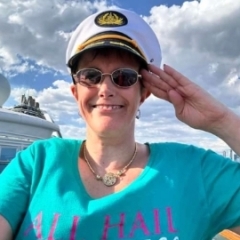Are Cruise Ship Doctors Safe?
Few things bring out fear, prejudice, and ethnocentrism more completely than medical care on cruise ships. We’re all subject to a bit of this. After all, when ill, who doesn’t prefer mom’s chicken soup over an injection, regardless of how credentialed the medical professional may be? Alas, mom’s not on the cruise, so we have to rely on the ship’s medical staff. But is he/she credentialed? Yes. Is he/she what you are used to at home? No. Does it matter? Probably not.
First, the scare-tactics: an oft-cited paper by Consumer Affairs in 2002 found medical facilities on ships lacking. They were quite harsh without actually providing much data. For example, they claimed a survey conducted by the American Medical Association found 27% of ship doctors and nurses did not have ‘advanced training’ in treating heart attacks. They did not define ‘advanced training,’ so even a gastroenterologist serving a stint at sea could easily be considered unqualified. Yet these ‘severely lacking’ individuals, as the article called them, have a success rate that puts U.S. hospitals to shame. Indeed, losing merely .000004% of such patients are odds I’ll take any day! Those are numbers cited in that very same article, by the way. The language was damning. The numbers were not.
Ship doctors rarely see passengers for anything beyond dehydration or stomach ache. The overwhelming majority of medical issues you’ll have on a cruise will be what you brought with you: heart attacks being most common. Time is the most important issue in treating heart attack, not size of the facility. Still not convinced? Consider: “living on a cruise ship provides a better quality of life and is cost effective for elderly people who need help to live independently”, according to a study published in the Journal of the American Geriatrics Society (2004). Many elderly, high-risk folks hop from ship to ship, more than satisfied with ship facilities and personnel. A brilliant article from CNN Health explains much of ship doctor training: http://brev.is/pzt3
I’ve met many a cruise ship nurse and doctor. More than a few are American surgeons and nurse practitioners that have taken tours as ship medical personnel for a change of pace. But most ship doctors are not licensed in the U.S. That doesn’t mean they haven’t been licensed professionals for a great many years back home. That home may be from Europe, for example, or Africa. This is where ethnocentrism rears its ugly head. Whispers of witch doctors. I’ve read online complaints (generally from my fellow Americans) of “some African doctor identifying my wife’s ailment as caused by her sins and prescribing a bath in the blood of Jesus Christ.” I find this as plausible as reports of Elvis sightings.
Ultimately, cruise lines are not required to provide medical care at all. You are placing yourself under the perceived protection of a corporation; corporations that intentionally pay taxes in one country, register ships in another, hire employees from many, take passengers from yet more, then sail where there are no laws at all. If you have an underlying medical condition or concern, it behooves you to take responsibility for your own care by research and preparation. As ships often mention, their medical facilities are the equivalent of a small town. If a medical emergency emerges beyond the abilities of the ship, you will be helicoptered off to the nearest hospital. If that’s not in the U.S., so be it. If you are that terrified of the rest of the world’s standards, then don’t leave home.
By Brian David Bruns, author of national best-seller Cruise Confidential.
Pics of the people and places I blog about are on my website and FB pages, join me!














1 Comment
Recommended Comments